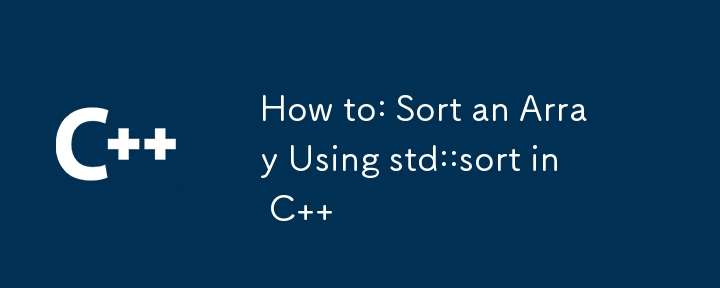Home >Backend Development >C++ >How to: Sort an Array Using std::sort in C
How to: Sort an Array Using std::sort in C
- Barbara StreisandOriginal
- 2024-10-23 21:00:021006browse

Sorting Array Using std::sort in C
In C , the standard template library provides the std::sort() function to efficiently sort elements in an array. For an array declared as int v[2000], the following code snippet demonstrates how to use std::sort() to achieve this:
<code class="cpp">#include <algorithm>
int main() {
int v[2000];
std::sort(std::begin(v), std::end(v));
}</code>
However, the std::begin() and std::end() functions introduced in C 0x/11 are essential for this approach. These functions return iterators representing the beginning and end of a given container, including arrays.
If you don't have access to C 0x, it's possible to define these functions yourself:
Begin function for non-const containers:
<code class="cpp">template<class Cont>
typename Cont::iterator begin(Cont& c) {
return c.begin();
}</code>
End function for non-const containers:
<code class="cpp">template<class Cont>
typename Cont::iterator end(Cont& c) {
return c.end();
}</code>
Begin function for const containers:
<code class="cpp">template<class Cont>
typename Cont::const_iterator begin(Cont const& c) {
return c.begin();
}</code>
End function for const containers:
<code class="cpp">template<class Cont>
typename Cont::const_iterator end(Cont const& c) {
return c.end();
}</code>
Overloads for C-style arrays:
<code class="cpp">template<class T, std::size_t N>
T* begin(T (&arr)[N]) {
return &arr[0];
}
template<class T, std::size_t N>
T* end(T (&arr)[N]) {
return arr + N;
}</code>
By using these functions, you can seamlessly sort an array using std::sort() in C .
The above is the detailed content of How to: Sort an Array Using std::sort in C. For more information, please follow other related articles on the PHP Chinese website!
Related articles
See more- C++ compilation error: A header file is referenced multiple times, how to solve it?
- C++ compilation error: wrong function parameters, how to fix it?
- C++ error: The constructor must be declared in the public area, how to deal with it?
- Process management and thread synchronization in C++
- How to deal with data splitting problems in C++ development

